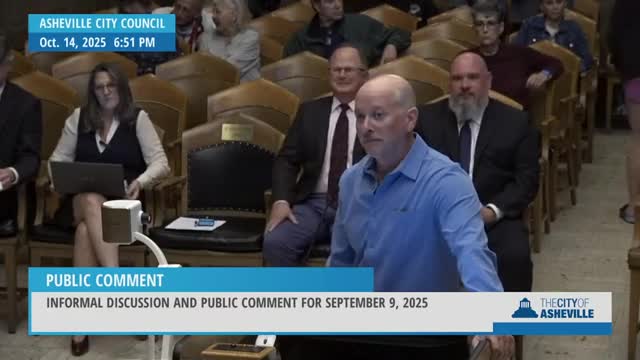Resident group warns of damage, sediment and public-safety risks at privately owned Kenilworth Lake dam; city staff point to state dam-safety jurisdiction
Get AI-powered insights, summaries, and transcripts
Subscribe
Summary
A neighborhood group told city council that sediment, hurricane damage and equipment failures at the privately owned Kenilworth Lake dam could pose flood and environmental risks to downstream neighborhoods and business areas.
Speakers representing the Kenilworth Lake Preservation Association told the council that sediment buildup and hurricane damage have reduced Kenilworth Lake’s capacity and impaired dam infrastructure, creating a potential high-hazard risk for Biltmore Village and downstream neighborhoods.
Eric Fisher, speaking for the association, described concerns including sedimentation, damage to a siphon system and gate valve that limit the ability to lower lake levels ahead of storms, toxic algae blooms associated with higher water temperatures, and discarded syringes and debris flowing over the dam into downstream waterways. Fisher said the association had documented its concerns to city staff, state and federal agencies and elected officials and asked for prompt action.
Assistant City Manager Jay Dundas and city legal staff responded in the meeting and via an email referenced in the agenda packet. Dundas said the city’s records indicate the Kenilworth Lake dam is privately owned and that the state Department of Environmental Quality’s Dam Safety program performs routine inspections. Dundas told council that DEQ conducted an inspection in April 2024; the department’s report provided to staff did not identify deficiencies that required immediate regulatory action but the inspection was described as “superficial” in the city staff summary. Dundas also said dam owners are required to maintain an emergency action plan and that the city had provided the plan to its emergency response team.
City staff and the city attorney said state dam-safety regulators are the primary authority for licensed high-hazard dams, and that state grant programs are available for private dam repair after the hurricane. The city attorney also explained legal limitations on using public funds to repair private infrastructure: the city may only exercise abatement authority in certain extreme circumstances and would generally be expected to charge costs back to a private owner when public funds are used for remediation.
Staff advised residents to coordinate directly with DEQ Dam Safety and to consider engaging an engineer with dam-specialty expertise if immediate professional evaluation is needed. Dundas said he had supplied the council with the DEQ inspection document and other materials in a staff email and apologized to Fisher that the association had not received a direct staff reply to his earlier message.
The council record shows the exchange as public comment and staff response; no direct council action to use municipal funds for the dam was taken. Staff said state grant programs and DEQ are the appropriate channels for technical evaluation and potential funding for repairs on private dams.
